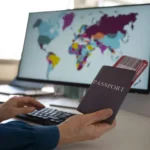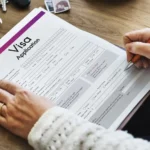Introduction
Studying in the United States has long been a goal for British students aiming for world-class education and future career opportunities. But in recent years, applying for a student visa has become a bit more complicated—especially because of social media scrutiny by U.S. immigration authorities. Yes, you read that right—your Instagram, Twitter, and even old Facebook posts could be part of the decision-making process when reviewing your visa application.
Why This Matters to British Students?
Thousands of British students apply to U.S. institutions every year, making the UK one of the largest international student sources for American universities. However, visa refusals have spiked in some cases, and social media activity is becoming a silent but powerful factor. Posts that may seem harmless could actually raise red flags with visa officers.
Understanding the Social Media Scrutiny
What’s Being Collected?
As part of the U.S. visa application process, students must now list all social media platforms they’ve used in the past five years. This includes usernames—not passwords—for sites like:
- YouTube
- TikTok
Authorities also request email addresses and phone numbers used during the same period. Even if your profiles are private, metadata and associations may still be visible to them through advanced tools.
Which Visas Are Affected?
The new rules mainly apply to:
- F-1 Student Visas
- J-1 Exchange Visitor Visas
- Other non-immigrant categories
Basically, if you’re going to the U.S. for study, research, or training, your digital trail is now part of the review.
Timeline of Policy Changes
Before 2019
Social media information was collected only in rare, flagged cases. Most applications were assessed through interviews, financial proof, and academic records.
After 2019
The U.S. State Department introduced a rule requiring almost all visa applicants to disclose their social media activity. This followed global trends toward using big data in border security.
Common Red Flags on Social Media
Political Content
Posts that:
- Criticize U.S. immigration policy
- Support radical or controversial political movements
- Share memes or articles promoting extremist ideas
Inconsistencies
If your visa states you’re going to study, but your LinkedIn says you’re “open to U.S. job opportunities,” that’s a red flag. Even sharing a meme joking about overstaying can be misinterpreted.
Illegal or Risky Behavior
Mentions or photos of:
- Drug or alcohol abuse
- Violence or hate speech
- Forged documents
- Fake profiles
Even old posts can harm your application.
Real Cases and Rejections
British Student Examples
In one known case, a UK student was denied entry for retweeting posts that were perceived as anti-American. In another case, a student who joked online about “never coming back to the UK” was flagged for potential immigration risk.
Legal and Ethical Concerns
British student unions and privacy watchdogs have raised questions about the fairness of such scrutiny. While the U.S. claims this is for national security, many fear it violates free speech and privacy rights.
Some UK universities now offer digital footprint training to help students protect their online presence before applying.
How British Students Can Protect Themselves
Audit Your Digital Footprint
Search your name online and review every public result. Use platforms like:
- Google Alerts
- Account cleaners (Jumbo, Incognito)
- Privacy Check-ups (Facebook & Google)
Clean Up Social Media
- Delete controversial posts
- Remove fake or duplicate accounts
- Make profiles private
- Untag from questionable photos
Be Honest on Your Application
Don’t omit a platform you’ve used. If you lie and get caught, your application can be permanently denied.
Expert Recommendations
Visa consultants in the UK advise students to:
- Prepare a digital CV that reflects your study intent
- Align all public information with your visa documents
- Avoid memes, jokes, or political arguments on public forums
What to Do If You’re Denied a Visa
- Review the refusal notice carefully
- Correct the issues (digital or otherwise)
- Reapply or appeal if allowed
- Consider other destinations like Canada, Australia, or the EU

Looking Ahead
As technology becomes more integrated into immigration processes, British students should assume that anything they post online might one day be reviewed. Future policies may even include AI-based evaluations, so staying mindful today is a smart move for tomorrow.
Conclusion
The U.S. remains a top destination for higher education, but getting there now involves more than grades and finances—it involves managing your online persona. For British students planning to study in the U.S. in 2025 and beyond, being cautious, consistent, and informed is your best strategy. Think before you post, because your future might just depend on it.
External Links:
‘Silenced and monitored’: Foreign students scrub social media after US visa move
Bengaluru students scrub social media for US visa applications
Internal Links:
“Indian Students Explore Study-Abroad Options Beyond the Big 4”
Privacy, Safety Fears Drive Australian Students Away from US Exchange Programs






